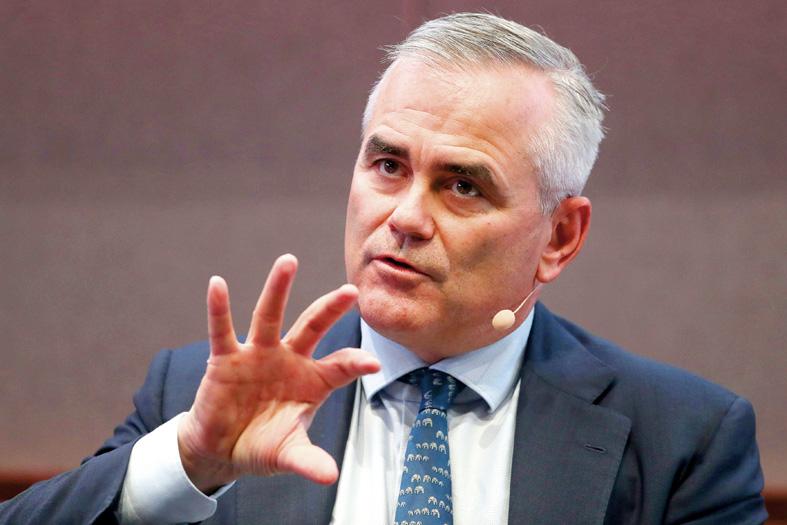Credit Suisse Group AG yesterday said that business in the fourth quarter so far has continued the trend of the previous three months, when the lender got a boost from advising on deals while trading revenue trailed peers.
The investment bank “continues to perform well,” with revenue higher than in last year’s fourth quarter, Credit Suisse said in a statement on its investor day.
In wealth management, stronger transactional business especially in Asia is offsetting headwinds from the stronger Swiss franc and negative interest rates, it said.

Photo: Reuters
The bank confirmed a target for a return on tangible equity of 10 to 12 percent in the medium-term and for capital distributions, while cautioning that reaching that goal next year would depend on provisions for bad loans.
Credit Suisse chief executive Thomas Gottstein is seeking to turn the corner after a series of setbacks overshadowed his first year in office, from loan losses to questionable dealings for a large client.
While he simplified the organizational setup, including at the securities unit, and started a review of the asset management business, he has been unable to stop a constant flow of bad news.
In the latest hit, an impairment on a hedge fund stake and potentially surging legal provisions threaten to affect fourth-quarter earnings.
Since Gottstein combined the investment banking and trading activities in one unit, the business has shown mixed results, with advisory doing well in the third quarter, while fixed-income trading — the largest revenue contributor — trailed peers.
The bank did not give any details on its trading performance so far this quarter.
The heads of the two largest US lenders, JPMorgan Chase & Co and Bank of America Corp, last week told investors that their investment-banking and trading divisions would notch a strong performance in the fourth quarter as economic activity stayed fairly resilient.
At Deutsche Bank AG, fixed-income trading grew 10 percent in October and 23 percent last month.
The COVID-19 pandemic also exposed some weaknesses in Credit Suisse’s asset management model, a business that is typically a source of stable income with little risk for the bank, but which suffered a number of fund implosions this year as well as a scandal involving one of its largest clients, Softbank Group Corp.
Credit Suisse said that it expects a significant turnaround at the unit next year.

Among the rows of vibrators, rubber torsos and leather harnesses at a Chinese sex toys exhibition in Shanghai this weekend, the beginnings of an artificial intelligence (AI)-driven shift in the industry quietly pulsed. China manufactures about 70 percent of the world’s sex toys, most of it the “hardware” on display at the fair — whether that be technicolor tentacled dildos or hyper-realistic personalized silicone dolls. Yet smart toys have been rising in popularity for some time. Many major European and US brands already offer tech-enhanced products that can enable long-distance love, monitor well-being and even bring people one step closer to

Malaysia’s leader yesterday announced plans to build a massive semiconductor design park, aiming to boost the Southeast Asian nation’s role in the global chip industry. A prominent player in the semiconductor industry for decades, Malaysia accounts for an estimated 13 percent of global back-end manufacturing, according to German tech giant Bosch. Now it wants to go beyond production and emerge as a chip design powerhouse too, Malaysian Prime Minister Anwar Ibrahim said. “I am pleased to announce the largest IC (integrated circuit) Design Park in Southeast Asia, that will house world-class anchor tenants and collaborate with global companies such as Arm [Holdings PLC],”

TRANSFORMATION: Taiwan is now home to the largest Google hardware research and development center outside of the US, thanks to the nation’s economic policies President Tsai Ing-wen (蔡英文) yesterday attended an event marking the opening of Google’s second hardware research and development (R&D) office in Taiwan, which was held at New Taipei City’s Banciao District (板橋). This signals Taiwan’s transformation into the world’s largest Google hardware research and development center outside of the US, validating the nation’s economic policy in the past eight years, she said. The “five plus two” innovative industries policy, “six core strategic industries” initiative and infrastructure projects have grown the national industry and established resilient supply chains that withstood the COVID-19 pandemic, Tsai said. Taiwan has improved investment conditions of the domestic economy

Sales in the retail, and food and beverage sectors last month continued to rise, increasing 0.7 percent and 13.6 percent respectively from a year earlier, setting record highs for the month of March, the Ministry of Economic Affairs said yesterday. Sales in the wholesale sector also grew last month by 4.6 annually, mainly due to the business opportunities for emerging applications related to artificial intelligence (AI) and high-performance computing technologies, the ministry said in a report. The ministry forecast that retail, and food and beverage sales this month would retain their growth momentum as the former would benefit from Tomb Sweeping Day